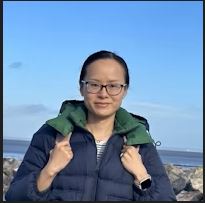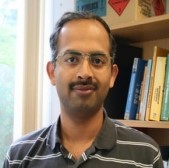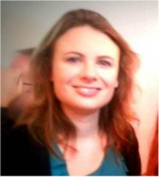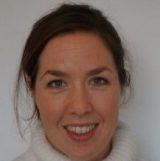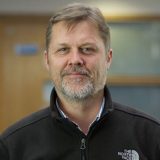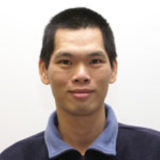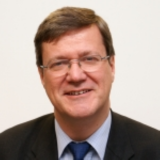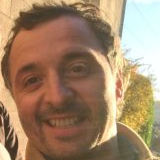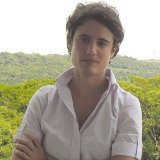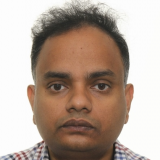Lu’s research focuses on simulating and assessing extreme hydrometeorological events like floods and heat waves, particularly in relation to climate change. Lu employs satellite remote sensing, environmental modelling, and machine learning to analyse urban and watershed contexts.
Prakash Kripakaran
Prakash is academic lead for the civil and structures research group at Exeter. His research interests are broadly in the design and management of civil infrastructures, such as bridges. He has significant experience in: the experimental and numerical modelling of flow and scour (erosion) around hydraulic structures such as bridge piers; the use of applied computing techniques including Building Information Modelling (BIM) for construction automation and design; the development of finite element modelling-based and data-driven strategies for interpreting measurements from bridge structural health monitoring; and the application of optimization methods for structural design problems (e.g. design of trusses and moment-resisting steel frames).
Peter Melville-Shreeve
Dr Peter Melville-Shreeve has worked in consultancy, startups and academic roles over the last decade. He works closely with the Chartered Institution of Water and Environmental Management’s (CIWEM’s) policy team to support sustainable water management systems and chair’s CIWEM’s Water Reuse Task & Finishing Group. Much of Peter’s early research focusses on rainwater management systems and the need for dual purpose designs – which can mitigate droughts and floods. His thesis highlighted the opportunities for Internet of Things technologies to be harnessed to reduce water demand AND manage stormwater flood risk. He consequently founded and exited a technology business which developed analytics and control systems to enable such technologies to be implemented at a range of scales.
Gemma coxon
I am a Lecturer in Hydrology within the Hydrology Group in the School of Geographical Sciences. My research focusses on understanding and predicting hydro-climatic extremes (floods and droughts) in changing environments. My expertise centres on building, applying and evaluating hydrological models for the improved simulation of water systems from local to continental scales across large samples of catchments.
Gabriel Yvon-Durocher
Gabriel researches the effects of environmental change on the structure and functioning of ecosystems (which comprise groups of species, their interactions with one another and with the physical and chemical environment in which they exist). His work spans multiple levels of biological organisation, from sub-cellular biochemistry to the dynamics of ecosystems, and searches for similarities across aquatic and terrestrial systems. The ultimate goal of his work is to develop a predictive ‘tool box’ to forecast how ecosystems will change in a world increasingly dominated by humans and the oceans.
Charles tyler
Charles is a reproductive physiologist and environmental biologist. His research interests include mechanisms of endocrine disrupting chemicals and nanoparticle ecotoxicology and assessing population level effects of contaminants in wildlife (primarily fish).
Kelly thornber
Kelly’s research focuses on the global threat of antimicrobial resistance and developing more sustainable aquaculture practices, both in the UK and globally.
Aimee Murray
Aimee’s research area is antimicrobial resistance in the environment, particularly due to anthropogenic impacts in wastewater and receiving environments. This includes evolution and ecology of antimicrobial resistance, direct selection at low concentrations and co-selection by other antimicrobials and non-antimicrobial compounds, environmental risk assessment, and developing and validating the novel ‘SELECT’ method for rapid determination of selective concentrations of antibiotics and environmental surveillance of antimicrobial resistance. She has a long-standing collaboration with AstraZeneca and engaging with industry and policy makers.
will gaze
Will research is in antimicrobial resistance in farmed and natural environments, including major elements of environmental sampling and wide-ranging analytical methodologies. This includes AMR evolution in the environment, using in situ and in vivo experiments, landscape scale dissemination of AMR and human exposure and transmission studies. Projects are divided into three main themes: ecology, evolution and public health perspectives. These map onto those identified in successive WHO, EU and UK AMR action plans facilitating interdisciplinary research approaches and joined up thinking.
Valentina Noacco
Valentina’s research interests include the development of tools and workflows to transfer sensitivity analysis methods and knowledge to industrial practitioners. This knowledge transfer aims at improving the consideration of uncertainty in mathematical models used in industry. Her current project aims to transfer methods, tools and expertise on sensitivity analysis to the (re)insurance sector in order to facilitate more informed decisions about the risks being underwritten.
Guangtao Fu
Guangtao’s research is focused on developing and applying new computer models, data analytics and artificial intelligence tools to tackle urban water challenges in water supply resilience, network leakage, flood risk, urban stormwater and wastewater management.
Raziyeh Farmani
Raziyeh specialises in urban water systems modelling, water resources management and asset management and has expertise in multi-objective optimisation of water networks. Her research interests covers evolutionary optimisation, artificial intelligence and data mining.
Slobodan Djordjevic
Slobodan researches the development and application of advanced methodologies and software tools for water management. These include: drainage and floods simulation, impacts of flooding, effects on human health and impacts on road transportation, resilience to diverse extreme weather events in the context of climate change, tidal energy extraction, water quality modelling, river and coastal engineering, water-food-energy nexus, cascading effects between water, waste, energy, transportation and other infrastructure systems, nature-based solutions, and drought risk management.
Albert Chen
Albert’s research focuses on water and human environment systems. Particular focus is on: hydraulic modelling, urban drainage, flood forecasting, innovation technology applications, water-food-energy-ecosystems nexus, climate change impact on critical infrastructure, prediction of water-borne disease, hazard impact and cascading effects assessment, and mitigation and resilience strategies.
DAVID BUTLER
David’s research area is urban water management, including sustainable and resilient water systems, integration and control and water-energy-carbon interactions.
Rupert Perkins
Rupert is a specialist researchers in algal photophysiology and productivity; taste and odour compounds in reservoirs; catchment management; variable chlorophyll floursecence and sediment/water column biogeochemistry.
Yacine Rezgui
Yacine specialises in modelling, data analytics, informatics (semantics), knowledge management; catchment and urban water management; resilience of the built environment to natural disasters; smart cities.
Paul Bates
Paul is a hydrologist by background, a Fellow of the American Geophysical Union and a Royal Society Wolfson Research Merit Award holder. He has widespread research interests in risk, resilience, uncertainty, governance and decision-making in relation to natural hazards and global water issues.
Benedek Plosz
Benedek’s research interests include assessing the fate of trace organic chemicals in urban water systems (pharma, drug biomarkers), computational fluid dynamics of bioengineered water systems, and biogeochemical used-water resource recovery.
Guy Howard
Guy’s research interests cover the resilience of sanitation systems to climate change, decentralised treatment systems, barriers to disease transmission and burden costs, cryptosporidium genomics, water and environmental health, focus on smaller rural communities in UK and nationally, politics around transboundary rivers, and hydropower.
Francesca Pianosi
Francesca’s research interests include the application of mathematical modelling to advance the understanding and support the sustainable management of human-environment systems, and in particular water resource systems.
Dawei Han
Dawei’s research interests include real-time flood forecasting, flood risk assessment, water resources management, GIS and remote sensing, natural hazards and environmental engineering.
Kemi Adeyeye
Kemi researches risks, opportunities and trade-offs in the urban and rural environments. Kemi’s work considers a holistic view of problems and identifies best solutions to issues in terms of technology, cost, management and adaptability. Kemi’s research interests include integrated design and planning, architectural technology, sustainability and resource efficiency (water) and resilience in modern and heritage contexts.
Sangaralingam Ahilan
Sangaralingam’s main interests are in sustainable urban flood risk management and the long-term performance of sustainable drainage systems, using detailed hydrological and hydro-morphodynamic modelling. He is also analysed SME behaviour in flooding aftermath.

